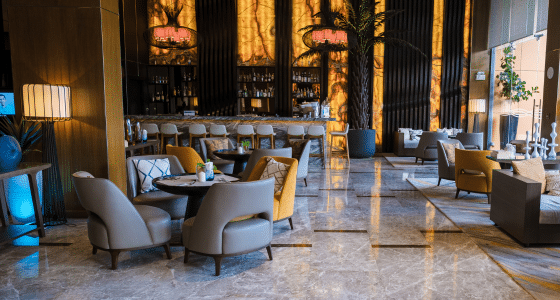Illuminating Hospitality: How Adaptive Lighting and Smart Control Transforms Venues
Lighting control in hospitality venues is more than just a functional necessity—it plays a pivotal role in shaping the guest experience.
From the welcoming ambiance of a hotel lobby to the intimate atmosphere of a fine dining restaurant, lighting can set the tone, influence mood, and even impact how food and drink are perceived.

“Adaptive lighting” and “smart lighting control” are two technologies that are revolutionising the hospitality industry, offering not just aesthetic benefits but also significant operational efficiencies.
What is Adaptive Lighting?
Adaptive lighting refers to lighting systems that can automatically adjust in response to various conditions, such as the time of day, occupancy levels, or even natural light availability. These systems allow hospitality venues to create a dynamic lighting environment that enhances the guest experience while being energy efficient.
The Benefits of Adaptive Lighting and Smart Lighting Control in Hospitality
- Enhanced Guest Experience
The right lighting can elevate any guest’s experience from good to unforgettable. With adaptive lighting, hotels, restaurants, and event spaces can tailor their lighting to suit the mood and purpose of any space. For example:
-
-
-
- Warm, ambient lighting in a hotel lobby can make guests feel welcomed and relaxed after a long journey.
- Bright, focused lighting in a conference room can boost productivity and focus during meetings.
- Subtle, dimmed lighting in a restaurant can create an intimate and romantic dining experience.
-
-
These subtle shifts in lighting are possible with adaptive control systems, ensuring that lighting levels automatically adjust to match the intended ambiance without requiring manual changes.
2. Energy Efficiency and Sustainability
In today’s environmentally conscious world, reducing energy consumption is a top priority for many hospitality venues. Adaptive lighting systems can significantly lower energy use by adjusting lighting based on occupancy or natural light. For example:
-
-
-
- Sensors detect movement and only light occupied areas, whether in a hotel corridor, restroom, or back-of-house areas.
- Daylight harvesting systems automatically reduce artificial lighting when natural sunlight is abundant, cutting down on unnecessary energy consumption.
-
-
Not only does this make the venue more sustainable, but it also leads to substantial cost savings on energy bills—an important factor for businesses operating 24/7.
3. Customisable Zones and Dynamic Control
One of the most powerful features of adaptive lighting systems is the ability to create customisable lighting zones. For hotels and restaurants, this means different areas of the venue can be lit independently, allowing for tailored experiences:
-
-
-
- Hotel ballrooms can be set with bright lighting for conferences and then switched to dimmed, romantic lighting for a wedding reception—all with the push of a button to operate a pre-set lighting scene.
- Restaurants can adjust lighting to different zones, creating a cozy atmosphere for dining while ensuring the kitchen remains well-lit for staff efficiency.
-
-
With smart lighting control for hospitality venues, this can be done remotely via a centralized system or even a mobile app, offering unparalleled flexibility and convenience for venue managers.
4. Improved Operational Efficiency
Hospitality venues are busy environments, with staff focused on delivering great service. Adaptive lighting systems take the hassle out of manually adjusting lights throughout the day. From turning lights on and off based on schedules to dimming or brightening spaces for special events, the system works behind the scenes, allowing staff to focus on guests.
Additionally, lighting control systems provide detailed reports on energy usage, making it easy for facility managers to identify areas where further energy efficiencies can be gained.
5. Smart Scheduling for Events and Special Occasions
The hospitality industry hosts a wide range of events, from weddings to corporate meetings, each with its own lighting needs. Adaptive lighting systems can be scheduled in advance to automatically adjust to the specific requirements of an event, ensuring the perfect lighting scheme is in place before the first guest arrives.
This not only enhances the experience for guests but also reduces the time staff spend on preparation. Automated lighting schedules can be synced with event start and end times, so lighting is optimized for every moment, from the setup to the last dance.
6. Health and Wellness Benefits
Adaptive lighting systems can also contribute to the well-being of guests and staff. The ability to adjust light intensity and colour temperature based on the time of day helps maintain natural circadian rhythms, improving sleep quality for hotel guests and reducing fatigue for restaurant staff. Morning lighting with cooler tones can help energize guests, while warmer tones in the evening promote relaxation.
Hospitality Venues That Benefit from Adaptive Lighting
Hotels
Hotels can enhance every part of their guest experience—from rooms that adjust lighting for day or night, to public spaces that evolve as the day progresses. The result is an environment that feels personalized and responsive.
Restaurants
Whether it’s a fast-paced, bright café in the morning or a dimly lit, romantic venue in the evening, restaurants can fine-tune their ambiance to suit every dining experience, leaving a lasting impression on customers.
Event Spaces
For banquet halls and conference centres, where events range from daytime seminars to evening galas, the ability to customize lighting for each occasion is invaluable. Adaptive lighting allows spaces to transform easily and effectively, helping venues create unforgettable moments.
Bars and Lounges
Bars can use adaptive lighting to transition from a casual daytime vibe to an energized evening scene, using smart controls to enhance the mood as the night progresses.
Conclusion: Lighting the Way Forward for Hospitality
Adaptive lighting and smart control are game changers for hospitality venues, providing a perfect blend of ambiance, energy efficiency, and operational convenience. By integrating these technologies, a well-designed and programmed system for lighting control in hospitality venues such as hotels, restaurants, and event spaces can offer guests an elevated experience, reduce their environmental footprint, and improve overall efficiency.
For hospitality businesses, the future is bright—literally and figuratively—with adaptive lighting leading the way.
Get in touch for ideas on how adaptive lighting and smart controls can enhance the environment offered at your venue.


